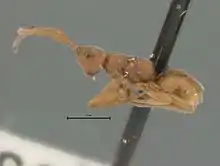Embolemidae
Embolemidae is a small family of around 64 species and 3 genera distributed around the world.[1] They are small solitary parasitoid wasps, and are parasites on planthopper nymphs of the families Achilidae and Cixiidae.[2]
| Embolemidae | |
|---|---|
 | |
| Embolemus nearcticus | |
| Scientific classification | |
| Kingdom: | Animalia |
| Phylum: | Arthropoda |
| Class: | Insecta |
| Order: | Hymenoptera |
| Superfamily: | Chrysidoidea |
| Family: | Embolemidae Förster, 1856 |
| Genera | |
Biology
Females are wingless while males have wings, and in temperate regions emerge later than the females, which overwinter as adults.[3] The wingless females have been recorded from the nests of ants and small mammal burrows,[1] or under stones in pastures and grasslands and they appear to act as ant mimics. A Palearctic species, Embolemus ruddii, has been found in association with the ant species Formica fusca and Lasius flavus, while in Japan, Embolemus walkeri was taken in a nest of another ant, from the genus Myrmica.[4] A Nearctic species, Embolemus confusus, has been reared from nymphs of a planthopper in the family Achilidae, where the host fed on fungi beneath the bark of rotting logs. The wasp larva lives in a bulging sac attached to the host nymph between the second and third segments.[4][5]
Fossil species
After[2]
- Ampulicomorpha Ashmead 1893
- †Ampulicomorpha janzeni Olmi et al. 2014 Burmese amber, Myanmar, Cenomanian
- †Ampulicomorpha perialla Ortega-Blanco et al. 2011 Spanish amber, Albian
- †Ampulicomorpha quesnoyensis Chény, Guillam, Nel and Perrichot, 2020 Oise amber, France, Ypresian
- †Ampulicomorpha succinalis Brues 1933 Baltic amber, Rovno amber, Eocene
- †Baissobius Rasnitsyn 1975
- †Baissobius carolianus Rasnitsyn 1996 Dzun-Bain Formation, Mongolia, Aptian
- †Baissobius minimus Rasnitsyn 1996 Zaza Formation, Russia, Aptian
- †Baissobius minutus Olmi et al. 2010 Zaza Formation, Russia, Aptian
- †Baissobius parvus Rasnitsyn 1975 Zaza Formation, Russia, Aptian
- †Cretembolemus Olmi et al. 2014
- †Embolemopsis Olmi et al. 2010
- †Embolemopsis baissensis Olmi et al. 2010 Zaza Formation, Russia, Aptian
- †Embolemopsis maryannae Olmi, Jarzembowski, Capradossi and Perkovsky, 2020 Wealden amber, Wessex Formation, United Kingdom, Barremian
- Embolemus Westwood 1833
- †Embolemus burmensis Perkovsky, Olmi, Müller, Guglielmino and Rasnitsyn, 2020 Burmese amber, Myanmar, Cenomanian
- †Embolemus cretacicus Perkovsky, Olmi, Müller, Guglielmino and Rasnitsyn, 2020 Burmese amber, Myanmar, Cenomanian
- †Embolemus excitus Perrichot and Engel 2011 Baltic amber, Eocene
- †Embolemus ohmkuhnlei Perkovsky, Olmi, Müller, Guglielmino and Rasnitsyn, 2020 Burmese amber, Myanmar, Cenomanian
- †Embolemus zherikhini Perkovsky, Olmi, Müller, Guglielmino and Rasnitsyn, 2020 Burmese amber, Myanmar, Cenomanian
- †Ponomarenkoa Olmi 2010
- †Ponomarenkoa ellenbergeri Olmi et al. 2013 Burmese amber, Myanmar, Cenomanian
- †Ponomarenkoa polonica Ponomarenko 1988 Baltic amber, Eocene
References
- Simon van Noort (2017). "Embolemidae". WaspWeb: Hymenoptera of the Afrotropical region. Iziko Museums of South Africa. Retrieved 8 July 2017.
- Perkovsky, Evgeny E.; Olmi, Massimo; Müller, Patrick; Guglielmino, Adalgisa; Jarzembowski, Edmund A.; Capradossi, Leonardo; Rasnitsyn, Alexandr P. (November 2020). "A review of the fossil Embolemidae (Hymenoptera: Chrysidoidea), with description of seven new species and history of the family". Cretaceous Research: 104708. doi:10.1016/j.cretres.2020.104708.
- J.T. Burn (1997). "Embolemus ruddii (Westwood,1833)". Bees, Wasps and Ants Recording Society. Retrieved 8 July 2017.
- C. van Achterberg; R.J.M. van Kats (2000). "Revision of the Palaearctic Embolemidae (Hymenoptera)". Zoologische Mededelingen. 74: 251–269.
- "HYMENOPTERA, Embolemidae (Chrysidoidea) (formerly Bethyloidea)". University of California, Riverside. Retrieved 8 July 2017.